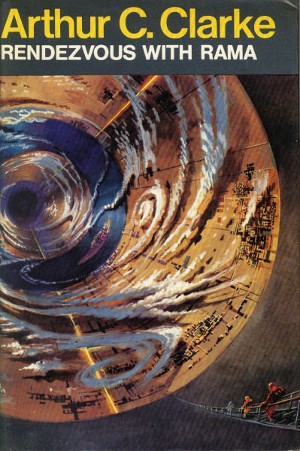Dialogue. Dialogue brings a story to life. Dialogue makes characters real. Dialogue is critical to any story.
That’s the sort of truth new writers are invited to accept and, most likely, it’s good advice. I’ve given advice like this myself. But when reading Rendezvous with Rama, the multi-award winning novel which sits on many SF top 10s, you’ll have to wait until chapter four until you hear so much as a peep out of any character. (Lieutenant Joe Calvert says: “In three minutes we’ll know if it’s made of anti-matter.”)
So is dialogue really so important? Perhaps in science fiction, where the concepts and original ideas are more important than characters, dialogue can be ignored completely? And when it comes, it doesn’t matter if it sounds clunky, right?
Maybe that was true in 1972, but these days, I think, dialogue does matter. Less so in science fiction than in other genres, but it still matters. Times have changed and so have our standards. We do not have to write space-based soap-operas, but we do need a bit of believable dialogue for the characters who populate our stories.
Unfortunately Clarke’s main character, Commander Norton, comes across as less than rounded. I think the author knew this and tried to do something about it late in the day. So we get to hear about Norton’s complex personal life, millions of kilometres from the action, but never is this relevant to the story. It is bolted-on information.
Of course, the sense of wonder is the main driver of the work and a 50km alien space cylinder was certainly pioneering for the time. Without it we would never have had the incredible feats of the Culture in Iain M Banks’s series of novels. But now we’ve seen sun-spanning ring habitats, a 50km tin can seems puny in comparison. In other words, Rama is a victim of the sub-genre it spawned.
Still, I’m glad I read Rendezvous with Rama and would recommend it to those who haven’t. One of the cleverest aspects of the novel is that it asks as many questions as it answers, thereby leaving one thinking. But is it a classic on a par with Isaac Asimov’s Foundation or Clarke’s own Childhood’s End? No. Not for me.
William Coffin
Zarg writes: What a way to treat visitors from another planet! After taking the details of this story from William Coffin’s mind I am even more concerned to remain undercover on Earth. You, dear reader, may mean me no harm, but I can see what would happen if my presence were widely known – and it’s not pretty. Even when humans stand ready to do the right thing, their decision-making systems conspire to ensure wrong prevails. You’ve seen it just last week in your leaders’ ham-fisted attempts to avert a financial crisis they do not properly comprehend. And you’ve seen it countless times in your local wars and other destructive practices. It is so much easier to document your decline than to halt it, but I will try to do both if I have the time.

